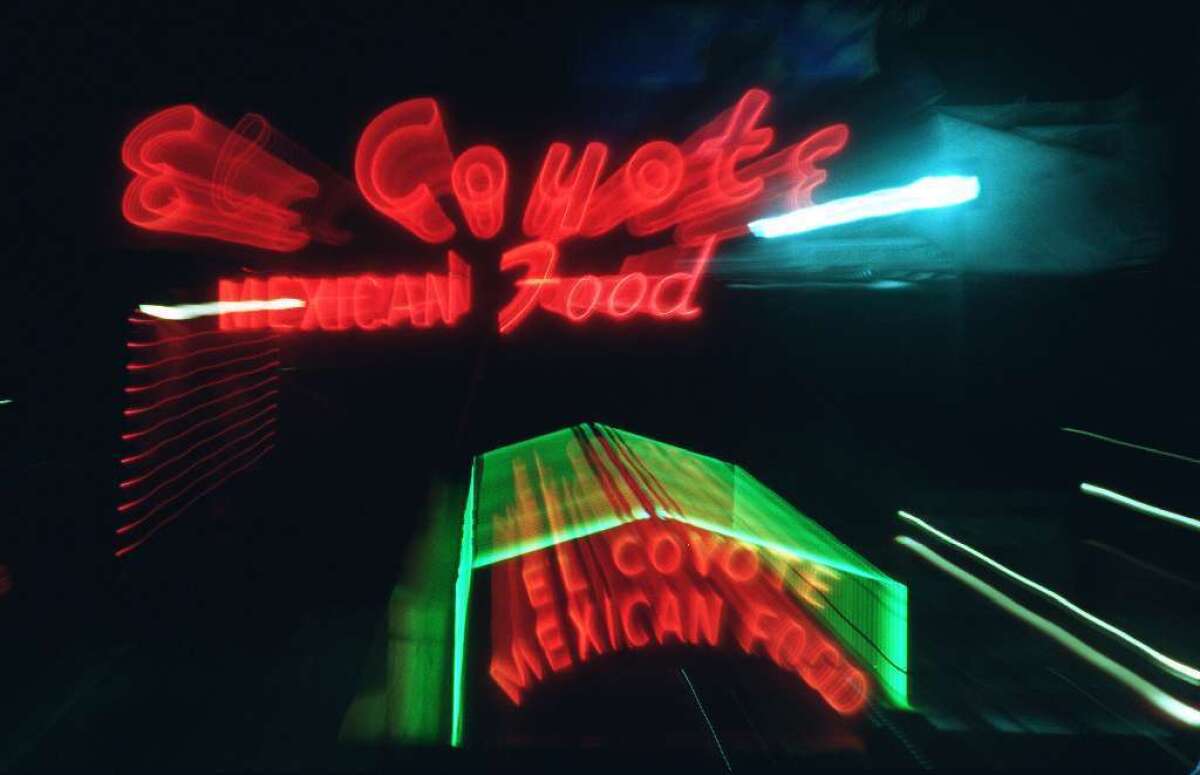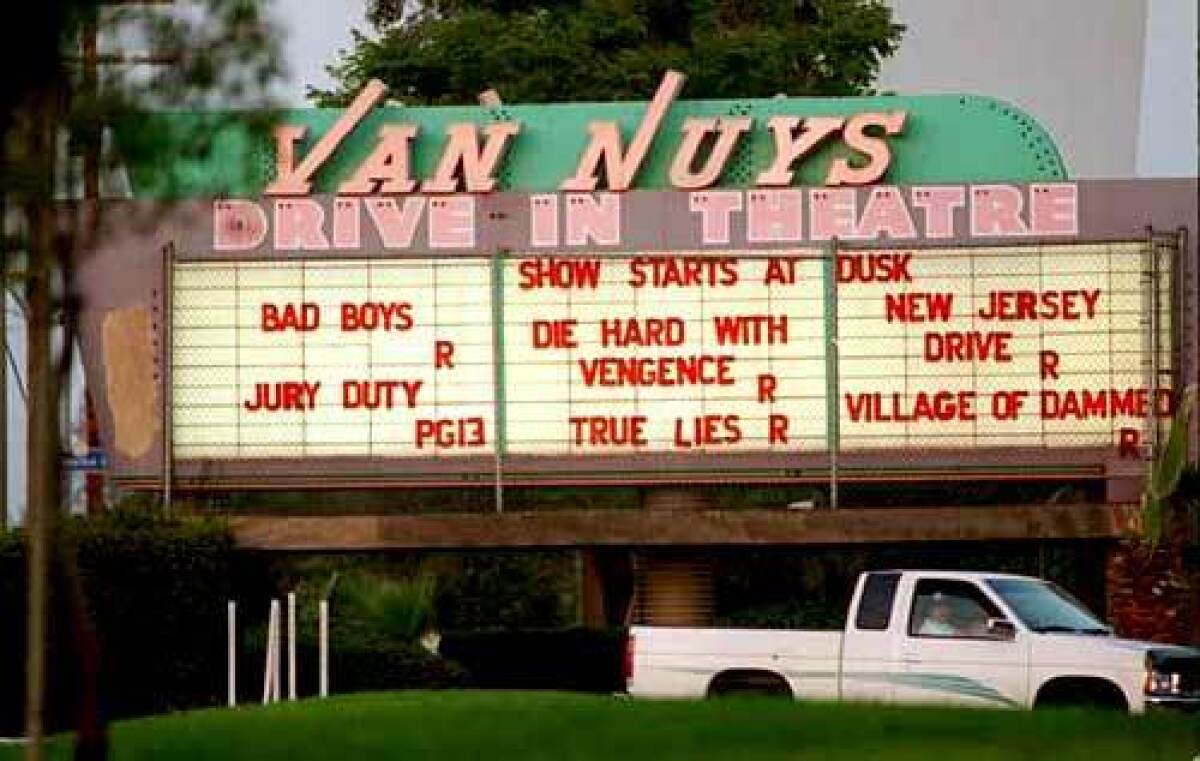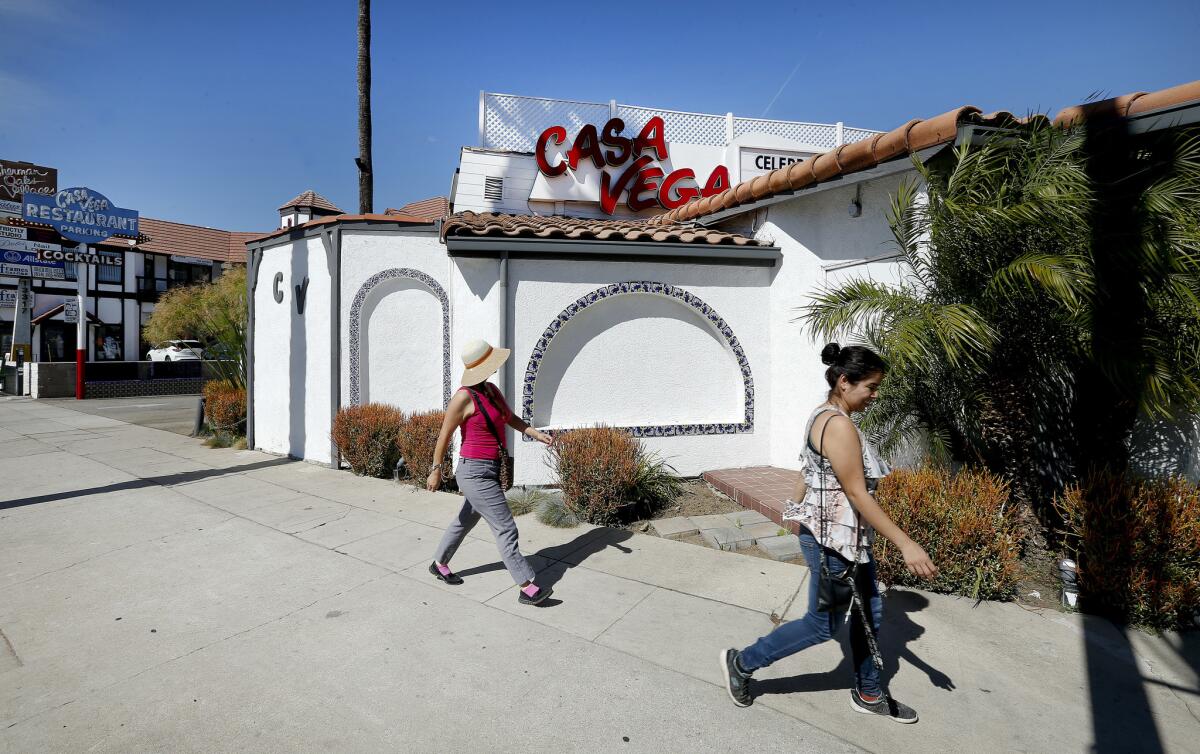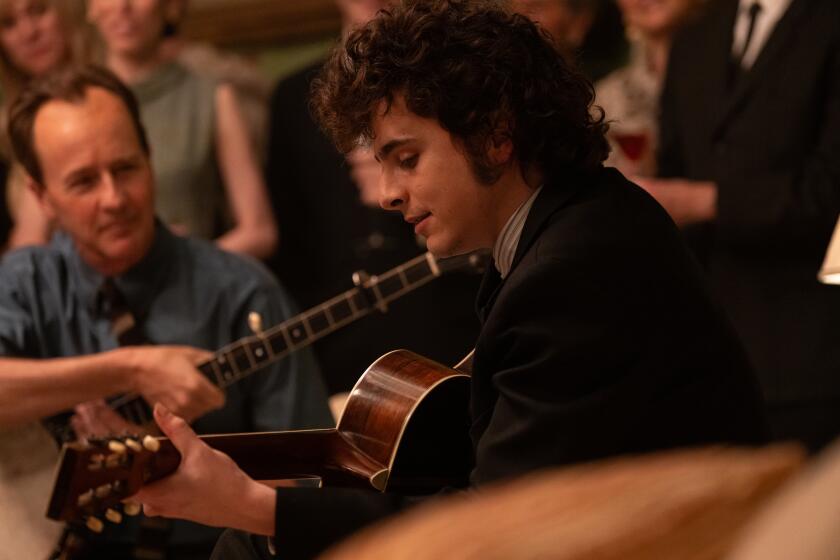Experience the L.A. captured in ‘Once Upon a Time ... in Hollywood’
Los Angeles is arguably the real star of Quentin Tarantino’s new film.
Starring Brad Pitt, Leonardo DiCaprio and Margot Robbie, “Once Upon a Time ... in Hollywood” is a love letter to the L.A. of Tarantino’s youth and pays its respects to some of the city’s iconic landmarks, some of which are still around.
Leonardo DiCaprio, Brad Pitt and Margot Robbie star in writer-director Quentin Tarantino’s fable set in tumultuous 1969 Tinsel Town.
Set in 1960s Hollywood, the movie was mostly shot in the greater Los Angeles area in locations that have retained their mid-century charm, including several restaurants the director frequents to this day. On some occasions, Tarantino had to use stand-ins for locations that no longer exist.
Here’s a list of some locales that are depicted in the film.
Musso & Frank Grill
Located on Hollywood Boulevard, Musso & Frank’s (as it’s commonly called) first opened its doors in 1919 under the name “Francois” and switched over to its current name in 1923. Still going strong, the restaurant has been a destination for some of Hollywood’s biggest names, including Elizabeth Taylor, Charlie Chaplin, Alfred Hitchcock and Orson Welles, and still hosts the likes of Tarantino and Keith Richards.
The restaurant has preserved its original decor, maintained a similar menu throughout its 100-year run and even still has an all-male wait staff that wears red jackets with black lapels.
That old-world elegance is captured in “Once Upon a Time...” when DiCaprio’s Rick Dalton meets a new agent (played by a smooth-talking Al Pacino) with Pitt’s Cliff Booth hanging out at the bar.
Spahn Ranch
In 1953, dairy farmer George Spahn purchased 55 acres of land in what is now Santa Susana Pass State Historic Park in Los Angeles County near Chatsworth. The property’s terrain made it the perfect setting for filming Westerns, and several movie sets were constructed on the ranch for such. Some notable works filmed on the ranch include the 1943 film “The Outlaw” and several episodes of the television series “Bonanza.”
Spahn’s rental horse business also led to the ranch becoming a prominent location for horseback riding.
Justin Chang looks at the evolving legacy of Quentin Tarantino as his latest film “Once Upon a Time ... in Hollywood” hits theaters.
In 1968, the Manson “family” was allowed to move into the ranch rent-free in exchange for manual labor. As shown in Tarantino’s film, this is where the Manson clan lived when it carried out the killing of Sharon Tate and others in 1969. A year later, a wildfire burned down all the structures on the property.
El Coyote

Originally opened in 1931 on La Brea, this beloved Mexican restaurant moved to its current home on Beverly Boulevard in 1951. Still a popular attraction, it is known for its house margaritas and elaborate holiday decorations and has hosted a litany of Hollywood stars, including John Wayne, Shirley Temple and Grace Kelly. On Aug. 8, 1969, the victims of the Tate murders ate their final meal here.
For “Once Upon a Time ... in Hollywood,” Tarantino shot that dinner scene in the same booth where Tate and her friends sat the night of their deaths.
Van Nuys Drive-In Theatre

The Van Nuys Drive-In Theatre first opened in 1948, right as the popularity and usage of cars soared in the late 1940s and ‘50s. The theater was demolished because of a shortage of money in 1998, when it was the last drive-in in the San Fernando Valley. A school now stands on its former grounds.
Pitt’s Booth lives behind the theater in “Once Upon a Time ... in Hollywood,” and scenes set at the long-gone drive-in were filmed at the Paramount Drive-In Theatres.
Casa Vega

The Sherman Oaks-based Mexican restaurant hasn’t changed much since it opened in 1956. With red-leather booths and bar chairs and waiters and bartenders clad in vests and bow ties, the restaurant has maintained much of its mid-century charm.
Casa Vega has been a celebrity hangout for decades and is now a favorite of the Kardashians. In January, the restaurant introduced a new margarita in honor of the “Once” director simply called “The Tarantino,” which was created by the man himself.
Late in the film, DiCaprio’s Dalton has a heart-to-heart talk with Pitt’s Booth, which we won’t spoil here.
Playboy Mansion
Constructed in 1929 by architect Arthur R. Kelly, the luxurious mansion didn’t play host to Hugh Hefner and his many Bunnies until it was purchased by Playboy for $1.1 million in 1971.
The Gothic-Tudor home was a monument to excess with 29 rooms, including a wine cellar and a screening room with a built-in pipe organ, a pool with a grotto and a total of nearly 20,000 square feet.
Over the years Hefner hosted many a celebrity-filled parties, one of which is portrayed in “Once Upon a Time ... in Hollywood.” (Keep your eyes peeled for cameos by actors portraying Mama Cass and Michelle Phillips of the Mamas & the Papas, whose songs are featured prominently in the film.)
In 2016, the Playboy manse was purchased by tycoon Daren Metropoulos for $100 million, and, since Hefner’s death in 2017, is no longer used by Playboy.
Regency Bruin Theatre
Built in 1937, the Bruin Theatre is located in Westwood Village near the UCLA campus. In “Once Upon a Time ... in Hollywood” Robbie’s Sharon Tate delights in watching herself act in the film “The Wrecking Crew,”alongside Dean Martin. Along with the Fox Theatre, the Bruin was designated a Los Angeles Historic-Cultural Monument in 1988.
The theater is still around and even hosted a screening of “Once Upon a Time ... in Hollywood” this week.
10050 Cielo Drive
That’s the address of the house where the Tate murders were carried out by the Manson family in 1969. The Normandy-style farmhouse was located in Benedict Canyon in the Santa Monica Mountains.
Before becoming the residence of Tate and then-husband Roman Polanski, some of its star-studded inhabitants included Cary Grant, Henry Fonda, Olivia Hussey and Candice Bergen.
In 1994, the house was demolished and a new house was built at the site, but with a new address. The last resident of the home before it was torn down was musician Trent Reznor of Nine Inch Nails, who used it as a recording studio for the album “The Downward Spiral.”
Sharon Tate’s life and death became an alluring portrait upon which to hang our what-ifs and darker fascinations.










